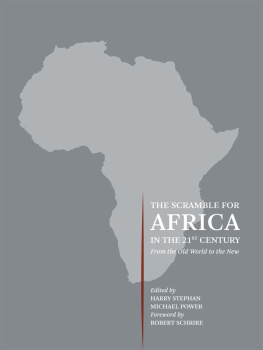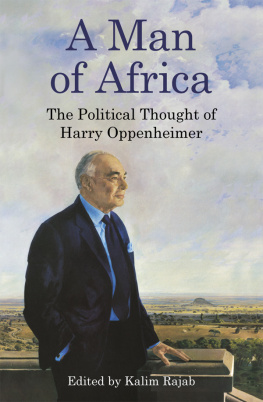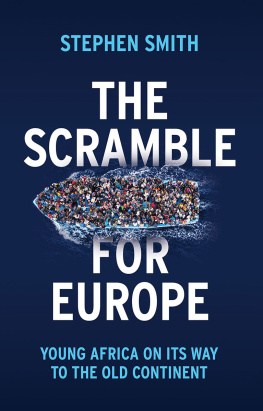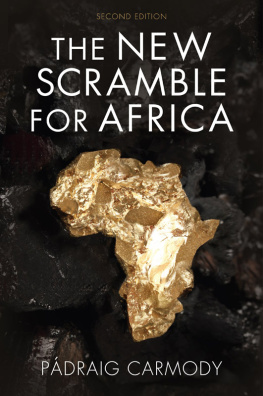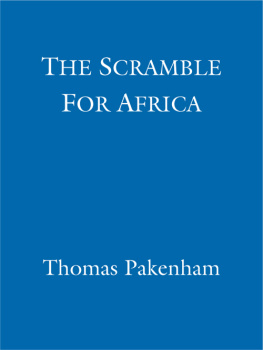Harry J Stephan - The scramble for Africa in the 21st century : a view from the South
Here you can read online Harry J Stephan - The scramble for Africa in the 21st century : a view from the South full text of the book (entire story) in english for free. Download pdf and epub, get meaning, cover and reviews about this ebook. City: Cape Town, year: 2006, publisher: Renaissance Press, genre: Politics. Description of the work, (preface) as well as reviews are available. Best literature library LitArk.com created for fans of good reading and offers a wide selection of genres:
Romance novel
Science fiction
Adventure
Detective
Science
History
Home and family
Prose
Art
Politics
Computer
Non-fiction
Religion
Business
Children
Humor
Choose a favorite category and find really read worthwhile books. Enjoy immersion in the world of imagination, feel the emotions of the characters or learn something new for yourself, make an fascinating discovery.
- Book:The scramble for Africa in the 21st century : a view from the South
- Author:
- Publisher:Renaissance Press
- Genre:
- Year:2006
- City:Cape Town
- Rating:3 / 5
- Favourites:Add to favourites
- Your mark:
- 60
- 1
- 2
- 3
- 4
- 5
The scramble for Africa in the 21st century : a view from the South: summary, description and annotation
We offer to read an annotation, description, summary or preface (depends on what the author of the book "The scramble for Africa in the 21st century : a view from the South" wrote himself). If you haven't found the necessary information about the book — write in the comments, we will try to find it.
Harry J Stephan: author's other books
Who wrote The scramble for Africa in the 21st century : a view from the South? Find out the surname, the name of the author of the book and a list of all author's works by series.
The scramble for Africa in the 21st century : a view from the South — read online for free the complete book (whole text) full work
Below is the text of the book, divided by pages. System saving the place of the last page read, allows you to conveniently read the book "The scramble for Africa in the 21st century : a view from the South" online for free, without having to search again every time where you left off. Put a bookmark, and you can go to the page where you finished reading at any time.
Font size:
Interval:
Bookmark:
THE SCRAMBLE FOR
AFRICA
IN THE 21ST CENTURY
From the Old World to the New
THE SCRAMBLE FOR
AFRICA
IN THE 21ST CENTURY
From the Old World to the New
Edited by
HARRY STEPHAN
MICHAEL POWER
Foreword by
ROBERT SCHRIRE
Published by Renaissance Press
An imprint of Stephan Phillips (Pty) Ltd
P.O. Box 12246, Mill Street, Cape Town 8010 South Africa
Revised and reprinted in 2012
Publication 2012 Renaissance Press
Text 2012 Harry Stephan and Michael Power
All rights reserved. No part of this publication may be reproduced, stored in a retrieval system or transmitted, in any form or by any means, electronic, mechanical, including photocopying, recording or otherwise, without the prior written permission of the copyright owners.
Cover design: Jonathan Cane
Graphs: Phil Southwell
Layout: Jamstreet (Cape Town)
Set in 10 point on 12 point Arnhem
Printed and Bound by Creda Communications (Pty) Ltd,
P.O. Box 9403, Johannesburg 2000 South Africa
Production Management: DGR Writing & Research,
(011-7929951 or 082-5721682)
ISBN - 13: 978-0-9584766-3-8
ROBERT SCHRIRE
It is not often that an academic book published in South Africa survives to enter its second edition. The reception accorded to the first edition encouraged its two editors and principal authors, Harry Stephan and Michael Power, to revise many of the chapters. This second edition has been well worth the effort.
What is particularly significant is that both authors straddle the divide between the world of scholarship and the world of business. Stephan is a UCT-based academic and the managing director of a large company which is involved extensively in fishing and agriculture. Power is an analyst with a major financial services company. This duality enables them to bring scholarship to bear on the major contemporary issues, but also infuses their analyses with insights derived from the world of business.
Although aimed primarily at a student audience, this book deserves a far wider readership. It attempts, with some success, to bridge the gaping divide between theories of global political economy and case studies of African economic development. Most studies of African economic progress since independence are atheoretical and concentrate on describing the poverty and limited development successes. They provide a mass of empirical data with interpretations largely based upon the internal characteristics of African society. Theorising, to the extent that it is applied, either blames African poverty on the venality of the leadership or focuses on the exploitative nature of global capitalism. In both cases the conclusions are generally both deterministic and pessimistic.
This book seeks to place Africa at the centre of the developmental process. The authors explore the dynamic changes in the global political economy and examine the theoretical work on development and globalisation to provide the reader with the analytic skills necessary to reach balanced conclusions. They argue with conviction that African states are not the helpless victims of global economic forces which they are helpless to change. Nor are Africas problems the exclusive result of domestic factors such as poor leadership and weak institutions.
Students of political science will be familiar with many of the key concepts: regime theory, two-level games, and realism. However, the theoretical material is clearly explained and its use in understanding African political economy is clearly demonstrated. Most readers will be convinced by this book that data without theory produces superficial and frequently misleading conclusions.
The authors focus on many of todays most important issues: the rise of China and the decline of old Europe, trade and the institutional framework which governs it, agriculture and foreign investment, and theories of globalisation. They argue convincingly that the world is changing rapidly and fundamentally and this creates new opportunities and dangers for African states. While neither optimistic nor pessimistic, they argue that Africa has new opportunities, which if it grasps appropriately, can lead to an African century. Africa can use the commodity boom as the foundation stone for more extensive and diversified development.
The rise of China creates new dangers and opportunities for development. Globalisation is not a monotonic force but a complex multidimensional process which creates both winners and losers. The last few decades have seen most African states emerge as losers while Western states have structured the process to benefit themselves disproportionately. Africa has new opportunities to co-operate with other states in fora such as BRICS to change the global architecture to level the playing fields.
The authors are not blindly optimistic that these opportunities will be grasped. But they argue that Africa is now in a position to shape its own destiny. And the road map is clear: Africa must work with other states to redesign the trade and investment regimes, build domestically strong and effective institutions and enable the informed public to have a voice in choosing appropriate policies.
A central theme is the need to move beyond one size fits all formulae. African societies are very diverse and appropriate policies will have to be based upon these diversities. For example foreign investment in agriculture can make an important contribution to welfare, but must take into account the culture and land owning systems of the population. The book therefore cannot provide a road map for the future. But it is surely correct in concluding that Africans hold the key to their future. And this is a major breakaway from the Afro-pessimism of the recent past.
Given the changes that have taken place since the first edition, we can all welcome this second edition. If the future reflects the recent past, we can look forward with anticipation to the future third edition of The Scramble for Africa in the 21st century From the Old World to the New.
CHAPTER I
HARRY STEPHAN
Would you tell me please, which way I ought to go from here, asked Alice. That depends a good deal on where you want to get to, said the Cat.
Lewis Carroll
Where is Africa going? As the title of this new volume avers, Africa is heading in a direction towards the New World and away from the Old. But have African leaders really decided where they want to get to? As Africa emerges from the ravages of the global credit crisis, African elites find themselves at a crossroads that require new economic and institutional models to build capacity. Finding these signposts and the concomitant road map on the way forward for Africa is not only the intellectual exercise that underpins this volume. It is also a means to test the economic and political theories that have been proposed in the Scramble series in light of the economic changes that have occurred since the global credit crunch began.
Looking back, if we were to view Africa in terms of the Old World, three writers, who have made an indelible contribution to the formation or understanding of African development, immediately come to mind. The first, William Wilberforce, not only defined the madness of slavery, but also led the abolitionist movement to end the transports of the Middle Passage. His work still applies in terms of the scourge of human trafficking today and the problems of economic refugees that huddle in the shadows of economic globalisation. The second, Karl Polanyi, wrote on the enclosure movement in England and self-regulating markets that never work. How prescient he was in light of the banking crisis in the United States and its effects on Africa. How apt he is when viewing the problems of Land Grabs in Africa and the institutional framework required to mitigate against market forces that are currently defining where Africa has to get to. The third, Franz Fanon, describes the Manichaean logic that defined the relationship between the colonised and the colonists: that world where the colonised were dehumanised in the interests of a compartmentalised world divided in two. This same logic still pervades an economic world today where globalisation creates an economic reality that can only be described in terms of inequality and enormous disparities in lifestyles. These examples, or views, are by no means an exhaustive description of the African condition of the past, but they do focus our minds on a past that has defined Africa in terms of its relationship with the Old World.
Next pageFont size:
Interval:
Bookmark:
Similar books «The scramble for Africa in the 21st century : a view from the South»
Look at similar books to The scramble for Africa in the 21st century : a view from the South. We have selected literature similar in name and meaning in the hope of providing readers with more options to find new, interesting, not yet read works.
Discussion, reviews of the book The scramble for Africa in the 21st century : a view from the South and just readers' own opinions. Leave your comments, write what you think about the work, its meaning or the main characters. Specify what exactly you liked and what you didn't like, and why you think so.

